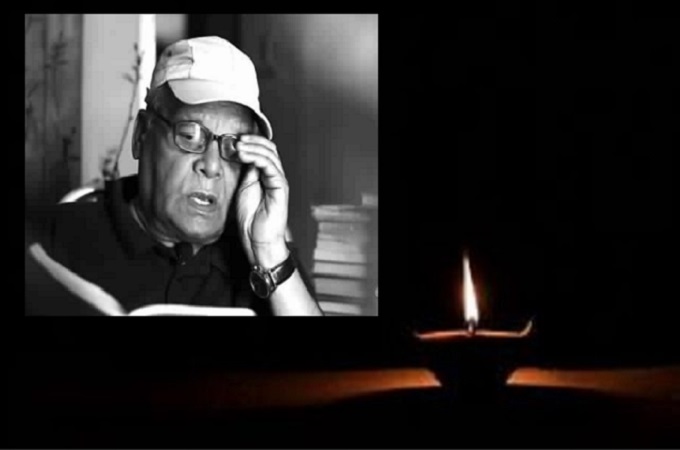As it happens, the news was conveyed by a terse ping on a Hindi literature group on WhatsApp. Newly appointed vice chairman of the Delhi Hindi Academy and noted Hindi poet Vishnu Khare was no more. He was 78.
I was to meet him for my Mumbai Mirror column at his Andheri home. He was looking forward to my visit and had said, “A good journalist must upset both sides. And literature should be fertilised with journalism — and journalists must read high theory so that they can upset their readers and trouble those who are in power.” The meeting did not happen.
A child of Chhindwara, Madhya Pradesh, and an MA in English literature, he translated TS Eliot’s poems into Hindi. “In May 1960, I translated the poem and wrote to Eliot’s publisher in England. They informed me that an Indian publisher from Orissa owned the copyright in all the Indian languages. So, I wrote to the Indian publisher who was delighted. Next I wrote a letter to Jawaharlal Nehru. I told him since you quoted Eliot in 1922, I think you must write the preface. His office replied that the PM was a bit busy with the monsoon session in Parliament but the letter has been passed on to Dinkar and Humayun Kabir,” he said. That’s how Ramdhari Singh Dinkar wrote a preface in Hindi for “a chit of a boy”.
As a 13-year-old, the wordsmith in him was chiselled by Maxim Gorky, Krishan Chander, Saadat Hasan Manto, Rajinder Bedi and Premchand. He said, “When I read these mind-makers, I knew what I had to write.”
Our last meeting was a year ago at a function to award Antarbharati’s Balshastri Jambhekar award to Balwant Jeurkar for translating Premchand’s biography Kalam Ke Sipahi into Marathi. Khare delivered a succinct, contrarian speech about the unreliability of Kalam Ke Sipahi as historical truth. It was brutal, and perhaps inappropriate, for an evening of celebration. But Khare did not care. “Sahityakaari ne sahitya ko maar daala hai,” he firmly believed.
During a programme I hosted along with Max Mueller Bhavan, he dissected Mumbai though the lens of literature. He said, “The Urdu writers came to Bombay to write for the films. And wrote the most brazen things about Bombay. Authors like Manto, Premchandra, Bedi, seem to be the pioneers who introduced Urdu to Bombay and Bombay to Urdu. It was through Urdu that Hindi had access to the city.”
Vishnu Khare gifted me three books in Hindi. One was Murdaghar by Jagdamba Prasad Dixit, penned in the 1970s. A brutal novel with 700 profane words. Then there were Manohar Shyam Joshi’s Kuru-Kuru Swaha and Hamzaad. He said, “Hamzaad is the darkest novel about Mumbai. It is completely bleak, has no ideals, no hope and no optimism. Joshi rips the facade of a modern city to shreds.”
During an evening to commemorate the contribution of Shani (the Muslim who wrote in Hindi, as Khare irreverently stated), Kedarnath, who passed away a few months ago, handed over the mike to Khare, joking that there are two things one must be aware of: pareshaani and Khare-shani. Khare grinned and was silent.
In that silence we heard the echo of: Kaho Toh Daro Ki Hai Yeh Kyon Keh Diya / Na Kaho Toh Daro Ki Poochenge Chupp Kyon Ho!
कहो तो डरो कि हाय यह क्यों कह दिया
न कहो तो डरो कि पूछेंगे चुप क्यों हो
सुनो तो डरो कि अपना कान क्यों दिया
न सुनो तो डरो कि सुनना लाजिमी तो नहीं था
देखो तो डरो कि एक दिन तुम पर भी यह न हो
न देखो तो डरो कि गवाही में बयान क्या दोगे
सोचो तो डरो कि वह चेहरे पर न झलक आया हो
न सोचो तो डरो कि सोचने को कुछ दे न दें
पढ़ो तो डरो कि पीछे से झाँकने वाला कौन है
न पढ़ो तो डरो कि तलाशेंगे क्या पढ़ते हो
लिखो तो डरो कि उसके कई मतलब लग सकते हैं
न लिखो तो डरो कि नई इबारत सिखाई जाएगी
डरो तो डरो कि कहेंगे डर किस बात का है
न डरो तो डरो कि हुक़्म होगा कि डर

Leave a Reply